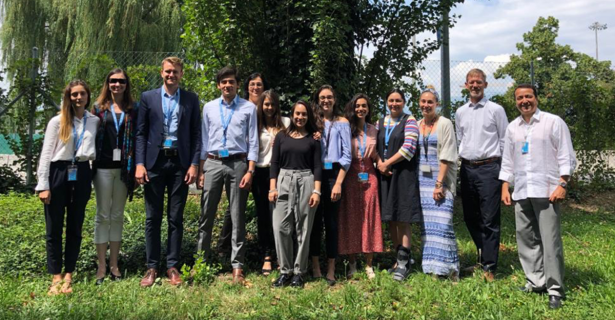Early morning commutes, coordination calls with training centers across multiple time zones, and losing track of the various languages spoken at the workplace. My second month in Geneva can be summarized as such. After an initial period of introductions, I have been fortunate to find in my organization and, more specifically, in my division, a truly engaged cohort of people that have made this summer a great learning experience. Their confidence and guidance have been key for me to keep up with the specific projects and tasks I have been charged with, and I am grateful for their support. Feeling so engaged and comfortable with the job and the city itself, I find it hard to process that in a month I will leave and return to a very different routine and environment back home, and then at Tufts.
Depending on who you ask the question: “what are the most important yearly events for the United Nations?”, you will get different answers. For those who are all about “high politics,” it might be when the Security Council meets in New York. For others whose countries do not get to enjoy the highly-criticized veto power some countries have in the Security Council, it may the General Assembly meetings in the fall. Others will say it is the Human Rights Council (HRC), and another group may argue that it is the High Level Political Forum (HLPF). I was fortunate to attend some sessions of the HRC in Geneva over these past few weeks and devote most of my time to coordinating two events that my agency (UNITAR) is organizing under the framework of the High Level Political Forum for Sustainable Development (HLPF). HLPF aims to bring together all relevant stakeholders in the field of development, ranging from heads of state to NGOs and civil society. Under an Executive Director who was actually one of the brains behind the UN’s Sustainable Development Goals (SDGs), UNITAR was heavily involved in the HLPF.
In my previous blog post, I described UNITAR’s basic structure and its divisions. My division, the Division for People and Social Inclusion, will host two events this coming Monday July 15: one focused on road safety and the other on the implementation of SDGs at the local level. Coordinating communications and other details to bring these events to fruition has not only exposed me to the logistical and managerial side of this, but most importantly, has made me think about the very message both events are trying to convey: the importance of understanding and addressing development through a multisectoral approach.
For example, it may be easy to think about traffic accidents where blame falls on individual drivers without giving the issue any further thought. While intoxicated or reckless drivers are responsible for thousands of accidents every year that hinder development, other factors also have a role to play. To name a few, ill-designed roads, faulty car technology, and unhealthy drinking habits are some of the broader structural issues that contribute to this problem. UNITAR’s joint proposal with partners in the private sector, to be presented at the HLPF, sheds light on the need to apply methodologies that tackle road safety as a structural problem in a results-based manner. With successful implementations in cities in Latin America, Africa, and Asia, the agency has proven the benefits of collaborating across the public-private divide.
Yet, multi-sector strategizing for development often misses an important actor: local (and regional) government. Think of migration, poverty, healthcare, or many other obstacles to development. Cities are often the frontline in dealing with said obstacles, yet they are excluded from the decision-making process, replaced by national governments that are often less experienced and informed about reality on the ground. UNITAR’s second event, which I have been honored to work on, brings together representatives from local governments to touch upon these points, share best practices, and think about what comes next.
There is no doubt that tackling sustainable development should be a global priority, as achieving these practices will not only reduce poverty and increase living standards but will also be instrumental in the fight against climate change. While many measures that have been taken so far are feeble at best, I am grateful for being exposed to some of the ideas on how to tackle this challenge. Devising ways to engage actors that have historically been shunned from the development conversations is key. Establishing relationships that explore ways to regulate the private sector and its vast influence and actively working towards development goals is also important. I am eager to see the outcomes of our events at the HLPF and see how my agency, the broader UN system, and all its affiliated organizations use this feedback to work towards better programming for the common objectives.

